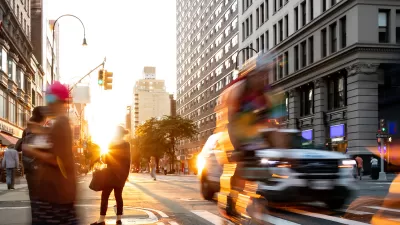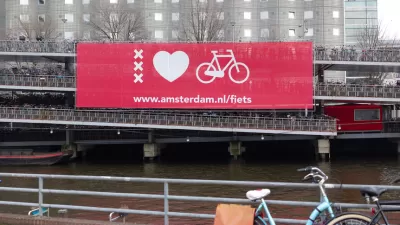In cities across America, cycling is fast becoming "just another way to get around," causing friction with its outsider reputation. Sarah Goodyear argues that for cycling to become safer for everyone, riders need to renounce their special status.
"Riding a bike in the United States has long been perceived as a statement," Goodyear says. "Being a bicyclist has been an identity, burdened with its own identity politics. The cyclist as renegade, outsider, maverick, or outlaw – that has been the image, or self-image, depending on where you stand on the 'issue' of cycling."
"But in the last couple of years, we have been moving at an almost imperceptible pace toward a different kind of reality – one in which American cities, from Chicago to Miami to Los Angeles to Boston and back around again — have been building bike infrastructure, implementing bike-share systems, passing laws protecting bicyclists, and the like."
"And biking is slowly, slowly becoming just another way to get around," she observes.
"There is a price to be paid for trying to move beyond the life-threatening rodeo days of cycling in major American cities," argues Goodyear. "It’s called civic responsibility. Playing by the rules. Making nice. Whatever you want to call it, it may mean that you’re going to have to give up your identity as a special person who does some special activity known as cycling."
UPDATE: Goodyear's piece has elicited quite the reaction, even among her own colleagues. For a counterargument on the greater enforcement of cycling laws, see Henry Grabar's response: "Why should people riding 20-pound bicycles obey laws designed to regulate the conduct of 4,000-pound cars, to say nothing of accepting the same penalties?"
"On balance, cyclists' illegal behavior—like that of pedestrians—adds much, much more convenience to life than danger," he argues. "Aggressive enforcement of traffic laws could upend the fragile system of incentives that leads thousands of people to undertake a long and sweaty commute each day."
Also see David C.'s rejoinder in Greater Greater Washington.
FULL STORY: Cyclists Aren't 'Special,' and They Shouldn't Play by Their Own Rules

Planetizen Federal Action Tracker
A weekly monitor of how Trump’s orders and actions are impacting planners and planning in America.

Restaurant Patios Were a Pandemic Win — Why Were They so Hard to Keep?
Social distancing requirements and changes in travel patterns prompted cities to pilot new uses for street and sidewalk space. Then it got complicated.

Map: Where Senate Republicans Want to Sell Your Public Lands
For public land advocates, the Senate Republicans’ proposal to sell millions of acres of public land in the West is “the biggest fight of their careers.”

Maui's Vacation Rental Debate Turns Ugly
Verbal attacks, misinformation campaigns and fistfights plague a high-stakes debate to convert thousands of vacation rentals into long-term housing.

San Francisco Suspends Traffic Calming Amidst Record Deaths
Citing “a challenging fiscal landscape,” the city will cease the program on the heels of 42 traffic deaths, including 24 pedestrians.

California Homeless Arrests, Citations Spike After Ruling
An investigation reveals that anti-homeless actions increased up to 500% after Grants Pass v. Johnson — even in cities claiming no policy change.
Urban Design for Planners 1: Software Tools
This six-course series explores essential urban design concepts using open source software and equips planners with the tools they need to participate fully in the urban design process.
Planning for Universal Design
Learn the tools for implementing Universal Design in planning regulations.
Heyer Gruel & Associates PA
JM Goldson LLC
Custer County Colorado
City of Camden Redevelopment Agency
City of Astoria
Transportation Research & Education Center (TREC) at Portland State University
Camden Redevelopment Agency
City of Claremont
Municipality of Princeton (NJ)




























